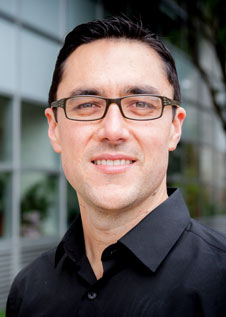
Dr Jason Gurney.
A new University of Otago study is aiming to tackle why Māori men have abnormally higher rates of testicular cancer compared to their non-Māori counterparts.
The case study comes after previous Otago research found Māori men have the highest rates of this disease in New Zealand. This is in contrast to international trends where men of European ancestry are the more common carriers of testicular cancer (TC). It is also the most common cancer affecting young men.
Steered by Dr Jason Gurney from the University of Otago, Wellington, the case control study aims to identify the key exposures of testicular cancer in New Zealand. It also aims to explore which factors could explain why testicular cancer rates are higher among Māori men than non-Māori men.
Using epidemiology and genetics, the team of researchers are currently conducting a pilot study in the Auckland region.
“I've been asking myself this question over and over: what exposure(s) might plausibly explain why Māori develop testicular cancer at greater rates than European men, and even greater rates than Pacific men,” he asks.
“Is it perinatal exposure to tobacco? Occupational pesticide exposure? A rare, highly-penetrant genetic variant? Or is this strange disparity driven by a complex combination of interacting environmental and genetic exposures?”
The Health Research Council-supported case study wants to study 300 Māori men – 150 with testicular cancer, and 150 control samples. They will be part of a wider sample group of 410 testicular cancer cases and 410 control samples.
“We will then collect data from both groups on a number of exposures that might cause this disease,” he says.
“Since many of the important exposures are thought to happen in utero, we will also collect data from the mothers of the cases and controls.”
Dr Gurney says he has spent two years in order to craft the best possible study.
“We're likely to only get one shot at this study – so I've spent the better part of two years reading, pondering and discussing the data we absolutely must collect during our study.
“Amongst the uncertainty, there is one absolute: that this puzzling mystery is waiting to be solved.”
For more information, contact:
Dr Jason Gurney
Senior Research Fellow, Public Health
University of Otago, Wellington
Tel +64 4 385 5541
Email jason.gurney@otago.ac.nz
Matiu Workman
Communications Advisor (Māori)
University of Otago
Tel +64 3 479 9139
Email matiu.workman@otago.ac.nz
Electronic addresses (including email accounts, instant messaging services, or telephone accounts) published on this page are for the sole purpose of contact with the individuals concerned, in their capacity as officers, employees or students of the University of Otago, or their respective organisation. Publication of any such electronic address is not to be taken as consent to receive unsolicited commercial electronic messages by the address holder.
FIND an Otago Expert
Use our Media Expertise Database to find an Otago researcher for media comment.
